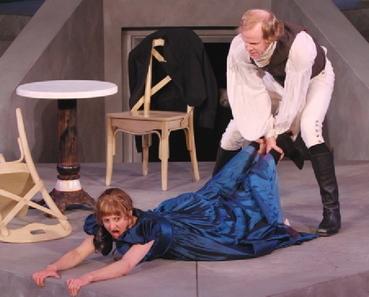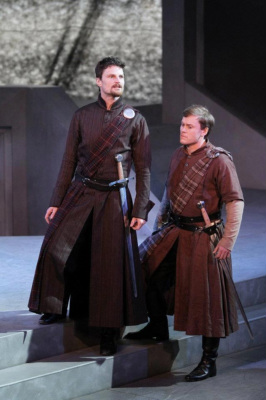In a nutshell, The Taming of the Shrew is a comedic look at the search for love. Beautiful Bianca (Dawn Petten) entertains a host of suitors who all vie for her father's approval and subsequently her hand in marriage. Her no-nonsense, older sister Kate (Lois Anderson) on the other hand, makes no bones about making intellectual mince-meat out of any man who crosses her path. Their father Baptista (Bernard Cuffling), promises Bianca's suitors that none shall have her hand until her older sister Kate is married. Bianca's suitors are at odds until they come across a man who surprises them all and takes on this challenge with sinister zeal.
Kate, with the reputation of shrew firmly affixed to the very mention of her name, wreaks verbal havoc in the village creating a moat of malice around her. Enter Petuchio (John Murphy), the man who attempts to tame her, and his trusty servant Grumio (Kayvon Kelly). Petruchio spins a web of confusion around Kate, resulting in their marriage and followed by a hilarious battle of wits that takes no prisoners.
This is the sort of play you cold see a few times (seriously, not a bad idea) and never be bored. Even the stage design is amusing.
A few days later the entire cast and crew shifts gears and changes tone completely as they ready to perform Macbeth. This is a hard play to tackle and the cast does a brilliant job. There are a few mishaps along the way, but nothing that can't be fixed with an attentive director.
Macbeth is the story of man plagued by false prophesies, psychosis, and an insatiable thirst for power. Macbeth murders everyone, from king to child, who blocks his path to becoming king.
Another thing that really stands out about this play is the sound design. Composer and sound designer, Murray Price weaves sound through the scenes, adding richness and filling the delicate spaces with a distinct tone.
There are, however, three things that have the potential to take you out of this play and will most likely be addressed as is the case with high caliber productions like these: the tone of the dialogue; the speed of the dialogue; the movement of some of the actors in the smaller roles.
Shakespeare's dialogue is difficult to follow on a good day. Many of the cast, speak with a monotone that at times drones the words together and can cause the viewer to disconnect from the action. The play is so dark and dramatic that it can be difficult to find the right pacing that will allow the performers to deliver the dialogue effectively as well as give pause long enough to register the effect of what's been said. Having said that, the pace could stand to be picked up just a little, especially in some of the less dialogue-heavy places.
Lastly, the slower pace of the main characters directly contrasts with the hyper pacing of some of the actors in smaller roles. At one point in the play, a young boy (one of the female actors in disguise) runs up to Macbeth to give him some news. His tiny, sped-up footsteps sent a wave of laughter throughout the audience on opening night: not likely something he'd intended to do. Even Lady Macbeth got a laugh when she sped up the pace near the end of the second half, but only because it was such a stark contrast to the slower, less effective pacing that had already been established.
After all that, none of these things is epic enough to warrant skipping this play. The actors give their all and are very good by all standards. The amount of effort put into these shows and the level of talent that we see on the stages is astounding.
For show times go to Bard on the Beach.



 RSS Feed
RSS Feed
